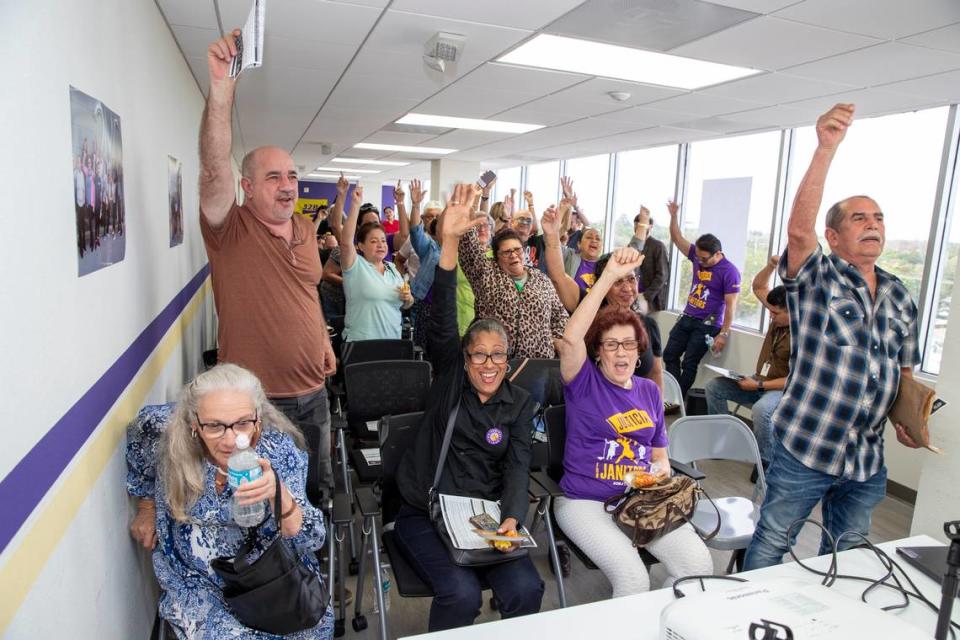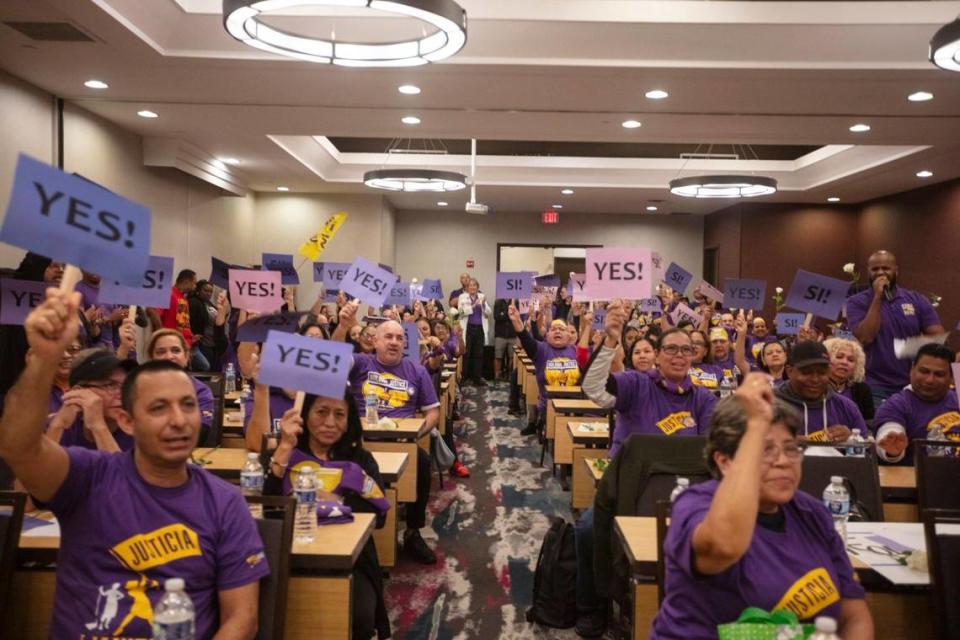Miami area janitors are among the lowest paid. An immigrant-led union has won better wages
A South Florida janitors union celebrated on Saturday after securing higher wages, more working hours, and extra paid time off for its members, who struggle to make ends meet in one of the most expensive areas to live in the country.
The improvement in benefits and salaries is the result of a new contract that offers significant pay raises, creates more full-time positions, and gives additional sick time and holidays to workers of the 32BJ SEIU union. It covers about 1,500 cleaners, mostly immigrant women, who clean office buildings all over downtown Miami and Fort Lauderdale.

“This contract is a testament to our power and shows that when workers come together, we can accomplish anything,” Vanesa Gándara, one of the group’s leaders, said in a statement.
Members unanimously voted to ratify the new agreement on Saturday afternoon. A recent report from the group found that, at $13.32 an hour, janitorial workers in the Miami region are among the lowest-paid compared to other major U.S. metro areas.
The development comes days after 32BJ SEIU members authorized a strike vote, which gave union leadership the ability to call a work stoppage. The Miami Herald reached out to some of the cleaning contractors who employ the workers on Friday afternoon, but they did not respond to requests for comment.

“This achievement showed my colleagues that our strength is in our unity,” said Aurora Mendoza, a 58-year-old Nicaraguan woman who cleans a gym in Brickell. “It gives us the strength to keep fighting, to protect the jobs we have now, and to earn other things we need.”
Members will earn nearly $4 per hour more over the course of the four-year contract, and long-time workers will also have an additional five days of paid time off. The contract will also provide for a legal fund to give them access to counsel. Union members often need help with immigration affairs, such as renewing work permits and green cards and applying for visas on behalf of family members, said Mendoza.
“As immigrants, we came to this country for better lives and to escape countries where we were persecuted and mistreated for raising our voices. But workers united will never be defeated,” Jackeline Bonnet, a cleaner from Colombia, said in a statement. “I paid $10,000 in legal fees to bring my family to this country. It gives me peace of mind to know that my coworkers and I now have access to the legal fund for ourselves and families.”
The union’s members are nearly all Hispanic and foreign-born, according to the union. They mostly hail from Latin America and the Caribbean, including countries such as Honduras, Cuba, and Nicaragua. During their fight for better pay, they marched across downtown Miami, shared their testimonies with local media and garnered the support of Miami-Dade officials.
The janitors said that many of them work part-time and have to find other jobs to help pay the bills. But their wages often don’t cover housing, caretaking, and healthcare costs. The janitorial work is also arduous. The workers scrub cubicles and conference rooms clean, carry heavy garbage bags and stock office supplies. Some have several floors assigned per shift, which doesn’t give them enough time to do all their duties, they told the Herald.
For workers like Elsa Romero, who has a part-time position, the contract will mean the possibility of earning more by expanding their job into a full-time gig. Romero, 60, came from Honduras almost 40 years ago. She cleans a house twice a week and also works as a janitor in the Miami Tower.
Romero has diabetes. She used to inject less insulin than her doctor prescribed to make the expensive doses last as long as possible. She became sick from not getting enough of the life-sustaining medication.
The new contract is a “relief” for Romero, and she hopes to soon be earning more money to pay for her healthcare and other living expenses. Now, Romero wants janitors who aren’t part of the union yet to join them. She recalls how scared she was when she first heard about the union, and she’s willing to visit office buildings to encourage cleaning workers to organize with them.
“We will keep fighting, because this isn’t over,” she said.


